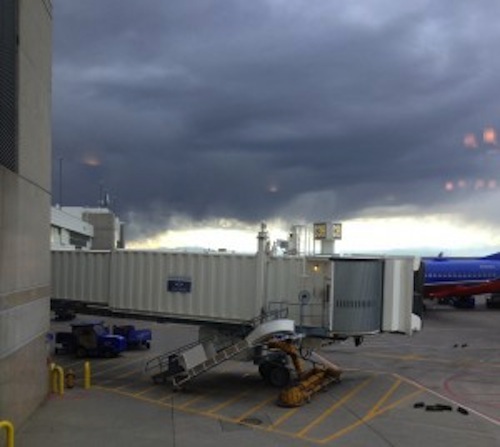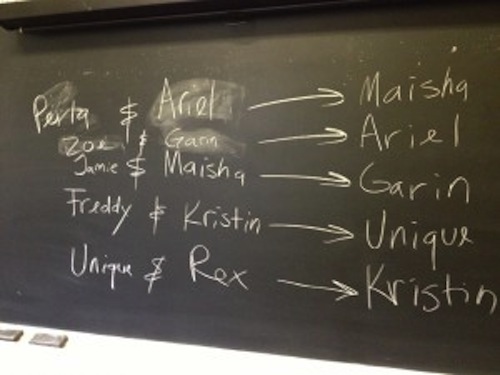
Maybe what I mean is more simple: music for classrooms. The sometimes tense, anxious atmosphere of a workshop. The continuous looping of tradition, or convention, or both. At worst: group think, bad advice, the canned music of busy work. I’m always wondering, can it be more musical? Layered? More ambient? Are those even the right questions?
This one goes out to any poet who has ever participated in one. Perhaps you’ve been “extremely annoyed by the uninspired sound atmosphere.” Who hasn’t? At some point? What percentage of poets I wonder in how many institutions or community centers or by skype hasn’t at this point spent some time there, some money, borrowed at a high rate. Who hasn’t stood in line, waiting their turn, absentmindedly browsing, in sudden duress or attention, our name called out over the microphone. Maybe we’ve changed seats, been student or teacher, taken the hotel voucher when weather turned inclement or slept on the floor. Waited there to meet family. Bored with the room, and each other. Or sometimes in some places it still holds a kind of dilapidated glamour, mid-century fantasies of travel. Mad Men. Lena Dunham goes to Iowa. The enormous privilege and outlay of resources.
Maybe by airports for classrooms I meant to say something about departures, Alarms and Excursions for the workshop and its limitations, the workshop and its possibilities. But the metaphor gets away from me, I see writers stuck there, waiting to “take off.” Not what I intended but not exactly wrong, either. Or I’m suspicious of the airport as metaphor at all, departure for any conversation other than one about the end of air travel (delicious shiver) because doesn’t it seem like that’s coming?
I spent some time there last weekend. Travelling by air. Between ports I visited a nondescript blue house, one of several in an assisted living franchise. I visited the Cheyanne mountain zoo, the world’s largest family pizza restaurant, and the hospital. I returned home and promptly “came down with something.” After the airports I went to work. To the spreadsheet, the meeting, the workshop. To a 40th anniversary celebration for Kelsey Street Press, with readings by Eleni Stecopoulos, Nico Peck, Patricia Dienstfrey, and Amber DiPietra.
When Amber climbed on the table and invited us to get comfortable, to place our bodies in a nice line, maybe she didn’t say “nice” or maybe she did, something about a line though, about putting our sacrum in contact with the floor or a surface, to feel it, I was already sitting on the floor and it was easy to go all the way down, there in the entryway to the Heller Rare Book Room. I saw Lara Durback on the floor somewhere near the front of the room. Waves of affection. It felt good. This really simple thing. I could see Amber’s legs on the table. Amber said she’d spent a lot of time in this position the last few weeks, in sexological bodywork training.
On the floor I thought of my grandmother, who I sat with between airports last weekend in a space of some extremity, of falling and bewilderment, bone touching bone, of leaving the house she resisted leaving for so long, a space of pneumonia, oxycodone, and broad-spectrum antibiotics. A no-space of extremity, without inhibitions, lifted by the combination of drugs and other changes in the brain, a space of emergent sexuality, desire, and anger, too. In the hospital she refuses food and the nurse asks if she is trying to maintain her figure: “I’m trying to get one.” She’s eaten very little in the years since my grandfather died. Here’s the body he was cruel to her for not having; it weighs very little. I think again of this post by Lauren Berlant, My mother died of femininity. When I tell my grandmother I love her she says don’t bother, it’s not worth anything, when she cries it’s often about family, they can’t do or be what she needs in this no-space of extremity, near death. I imagine she’s crying about whatever she gave up, all the sexuality and desire and anger, too, to maintain a certain shape, structure, family. What do I know. She came from a farm to the city to be modern. Almost immediately someone from a local church befriended my grandfather. He got saved and she followed. She was 18 or 20. They had two children. Bought a house. She worked for a doctor; he worked for the public utility.
Lying on the table, Amber talks about sexological bodywork, and the people who find their way there, to mobilize embodiment from its source, to connect with a reproductive core, the sacrum, people who are aging or artists or transgender or have experienced birth trauma or erectile dysfunction. Amber says that in doing this work she’s been very far from language. I think about my grandmother, how useless language was, sitting with her in that no-space. I wish for the alternative world in which a sexological bodyworker does rounds instead of a hospitalist.
Lying on the floor I’m not thinking that much about the ways Amber is pushing at the form of reading or talk, pressing the limits of a table where panelists sit, although that’s happening too. Amber talks about the holes of the body, its liquids, all the ways a body is disciplined and shaped by the rules about holes and liquids what they can and can’t do, when and where not.
I think about the workshop and how this experience, something like a body invited to be on the floor, in touch with the sacrum, does or doesn’t happen in the classroom. In some places it does. Workshops by CA Conrad, Bhanu Kapil, others. But mostly I think it doesn’t, or when the body enters it does so descriptively, as an idea. The body; somatics. And yet the extremity of its experience in those rooms, our bodies sitting there, in chairs around tables, those airports.
Music for airports: a syllabus I made this winter, or the first half of it. I wanted to info-share this syllabus, to say something about the possible connections between all the writing that happens out here, and all the writing that happens in there. Reception circuits, building them. Music and ambience. At some point this semester, work started to arrive in layers, complicated feedback stapled to poems in which it was sometimes difficult to tell one from the other. Beautiful, lyric feedback. Profoundly not busy work. Totally engaged. For their final project, someone is making a chapbook that takes as its preface feedback from another writer in class. When I got back from the airport this week, workshop was also a relief, to be there with. They don’t always work, but oh my god when they do.

And so, some tracks from it.
MUSIC FOR AIRPORTS.
We began by reading Mira Schor’s Fail! and talking about how the MFA program, as an institution, and durational unit, impacts the kind of work that gets produced inside it.
Everyone created a map of current, past, and aspirational affiliations, aesthetics, influences.
Everyone described a “bad” writing project they would never undertake.
For the next month and a half, everyone turned in new writing every week, and experimented with feedback models based on reception moments from the internet. These readings were intended as windows onto some public conversations around poetry.
Here is the schedule of readings and some notes on the feedback experiments.
1: epistolary response
Jackie Wang, Epistolary Review: The Evolutionary Revolution
Feedback experiment: write to someone outside of this class about poems by two people in class
2: 25 points
Nate Logan, 25 Points: Thunderbird
Leif Haven, 25 Points: Götterdämmerung Family BBQ
Feedback experiment: write 10-12 points on poems by two people in class
3: dialogues, distance
Ariel Goldberg & Rachel Levitsky, The Physical is a Social Fact
Feedback experiment: correspond with someone else in class. In your correspondence, discuss writing by two other people in class. What form will your correspondence take? Email? Recorded conversation? Will your voices remain distinct, or not?
4: constellations
Gesture blog, Books, Triangulation, and my interview with Kate Zambreno
Kenneth Goldsmith, The Writer as Meme Machine
Dawn Lundy Martin, The Stunning Poverty of Unrest
Feedback experiment: write no more than 100 words on three writers in this class (so no more than 300 words total). The idea is to write about this week's writing within a constellation, a group or cluster of related things, an assemblage: a set or configuration, as of related items, properties, ideas, or individuals.
5: “an entrance, a solicitation”
Brett Price, The New York School: On Naming
Dee Dee Kramer, On behalf of a poet who lives far away
Feedback experiment: write to or about one other person in class. You might ask questions of the other writer, or discuss your connections, how you met, what your relationship is or isn’t outside of class. You might begin with dissatisfaction, as suggested by Brett Price’s writing. Is there something about the feedback you’ve been giving and receiving that you’re disappointed or frustrated with? Are there “buried irritants” that might relate to this poem, or might this poem be a way of addressing those irritants? What challenges does this poem raise, which you might otherwise defer or not address?
6: process notes
Ronaldo Wilson with Andy Fitch, a conversation
Barbara Jane Reyes, You Spitfire Girl: The Poem and the Manuscript, Some Notes
Feedback experiment: write about your own work this week. You’re encouraged to use one of the models/experiments we’ve worked with thus far.
Next up: the chapbook. I tend to put too many things on the syllabus. The post always gets too long.
With gratitude to Zoe, Jamie, Freddy, Garin, Rex, Perla, Maisha, Unique, Kristin, and Ariel for their intelligence and generosity
Stephanie Young lives in Oakland, California. Her collections of poetry include Telling the Future Off...
Read Full Biography

